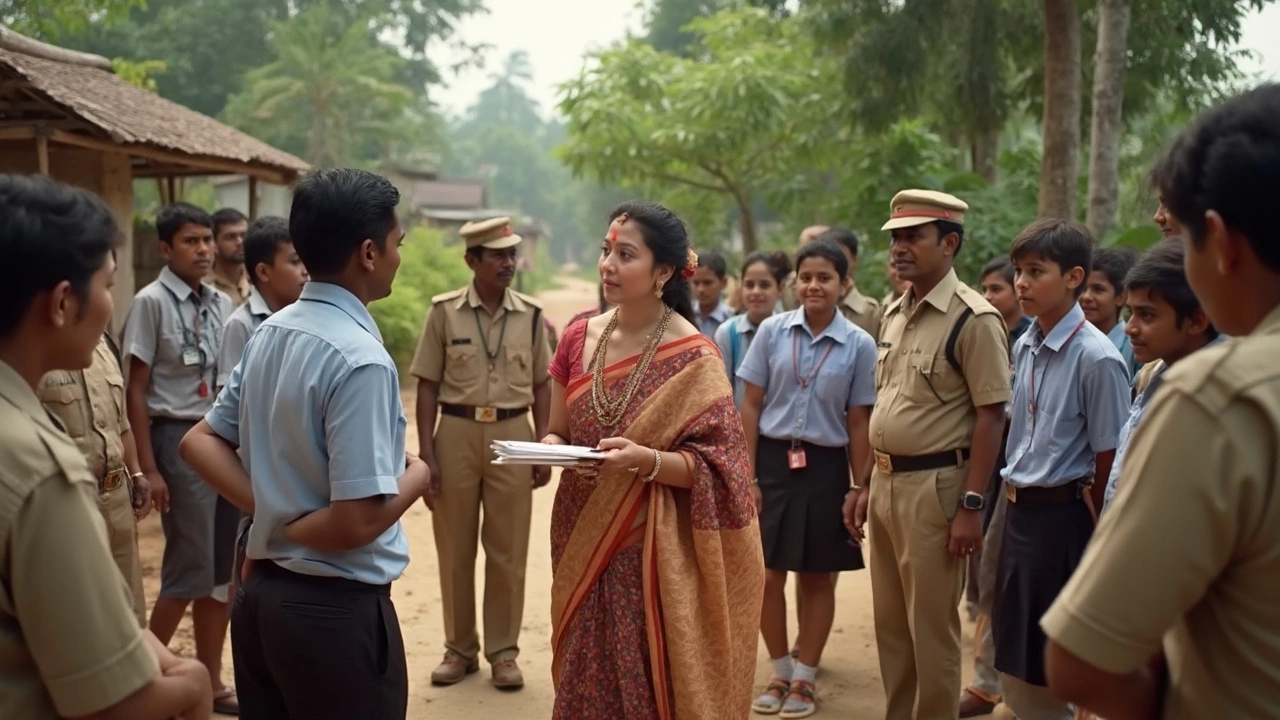
If the word 'government job' makes you think of slow desks and dusty files, you haven't seen the paycheck at the very top. Some government posts pay as much—or more—than private sector gigs, minus the insane hours and always-on stress. So, what’s the real dollar amount? Some senior Indian government officers pull in over ₹2.5 lakh a month, not counting all those extra perks that seriously pile up.
The highest-paying government jobs go way beyond your basic clerk or constable. We're talking top-tier roles like IAS and IPS at the secretary or director level, RBI Grade B managers, and some public sector enterprise (PSU) heads. It’s not just about the salary—think free bungalow, helper staff, travel allowances, and a lifetime of reputation no startup can buy.
If you’re dreaming big, you need a strategy because the competition is nuts. Every year, lakhs of people chase a handful of these golden posts. So, what does it take to land one of these, and what’s day-to-day life like when you finally make it? That’s exactly what you’ll find out as you read on.
- Who Bags the Big Bucks in Government Jobs?
- Top-Paying Government Roles: What Sets Them Apart?
- How Tough Is It to Crack the Exams?
- Salary Perks Beyond the Paycheck
- Tips for Aiming High in Government Careers
Who Bags the Big Bucks in Government Jobs?
When it comes to highest paying gov job options, you’re not looking at the usual staff or clerical roles. The real cash flows straight to the top brass. The biggest paychecks in the Indian government mostly land in the laps of civil servants like IAS, IPS, and IFS officers, especially when they reach senior positions.
At the top, you’ve got Secretaries to the Government of India. These officers can make around ₹2.5 lakh monthly. It doesn’t stop at basic salary. Their perks include a government bungalow, official car (with a driver), and staff for personal and office help. No wonder these jobs spark so much competition every year.
If you’re more interested in money than politics, RBI Grade B officers and senior PSU executives are big winners too. A General Manager at ONGC or GAIL can take home upwards of ₹3 lakh a month when you add up all the allowances and bonuses. Here’s how the salary and benefits stack up for some of these big guns:
| Post | Approx Monthly Gross Salary | Extra Perks |
|---|---|---|
| Secretary (IAS) | ₹2,50,000+ | Bungalow, car, official staff |
| RBI Grade B Manager | ₹1,10,000+ | Lux housing, allowance, paid travel |
| PSU GM (ONGC, GAIL, etc.) | ₹3,00,000+ | Bonus, car, medical, clubs |
Another fast-rising role in the government jobs money game: Indian Foreign Service officers. Once posted abroad, IFS officers’ take-home shoots up thanks to dollar or euro salaries and cost-of-living allowances. A posting in New York or London goes way beyond what you’d make back home.
But remember, it’s not just about the salary on paper. The reputation that comes with these roles and lifetime pension make them a dream pick. If you’re aiming for the big bucks in public service, you’ll want to set your sights on these positions before anything else.
Top-Paying Government Roles: What Sets Them Apart?
When people talk about the highest paying gov job, most start with the Indian Administrative Service (IAS). But IAS officers at the Secretary level aren’t the only ones cashing big paychecks. Let’s lay out some of these powerhouse positions.
- IAS and IPS Officers (at apex scales): The top-tier civil servants, like Chief Secretaries and DGPs, take home up to ₹2.5 lakh per month (basic + allowances). Add rent-free bungalows and government vehicles, and the real value skyrockets. The prestige? It’s unmatched in Indian society.
- RBI Grade B Officers: If finance is your thing, please look at Reserve Bank of India Grade B Managers. Not only do they get a solid base salary (up to ₹1.5 lakh/month after a few years), but RBI jobs are also cushy—limited work hours, solid job security, and a chill work vibe for most.
- Public Sector Undertaking (PSU) Executives: At the General Manager or Director level in companies like ONGC, NTPC, or IOCL, you’re easily looking at ₹1.5–₹2 lakh per month. There’s more: massive bonuses, official housing, long service perks, and regular foreign trips for some roles.
- Judges (High Court & Supreme Court): High Court Judges earn about ₹2.25 lakh per month, while Supreme Court Judges pull in ₹2.8 lakh monthly. They get official mansions, personal staff, and life-long security.
- Defence Chiefs: Top officers like Generals, Admirals, or Air Chiefs get paid similarly to apex civil servants. Plus: military perks (housing, healthcare for the family, travel, and post-retirement benefits).
| Role | Monthly Salary (₹) | Perks/Benefits |
|---|---|---|
| IAS/IPS (Top Level) | 2,50,000+ | Housing, car, medical, staff |
| High Court Judge | 2,25,000 | Mansion, security, staff |
| RBI Grade B Officer | 1,50,000 | Allowances, LTC, canteen |
| PSU Director | 2,00,000+ | Quarter, bonuses, car |
| Defence Chief | 2,50,000+ | Housing, security, pension |
So, what really sets these roles apart from a regular government jobs? It’s the whole package: salary, status, decision-making power, and job stability. Plus, these aren’t stuck behind a desk—they’re about running departments, taking calls that steer the country, and living a life most just watch in movies. If you want money, respect, and power, these are the gold standards in the Indian government sector.

How Tough Is It to Crack the Exams?
If you’ve ever Googled "highest paying gov job" and felt that itch to go after one, brace yourself: the grind is real. Government exams like UPSC Civil Services and RBI Grade B are famous for their insane level of competition. For example, the UPSC Civil Services Exam saw over 10 lakh registrations last year, but less than 1,000 candidates made the final cut. The RBI Grade B post only selects a few hundred out of lakhs. The odds aren’t anything to joke about.
Let’s break down why these exams are so tough:
- Syllabus that never ends: The syllabus for exams like UPSC covers everything—history, economy, polity, science, current affairs, essays... there’s basically no end.
- Multiple stages: Most of these government jobs involve clearing not just one, but often three stages—prelims, mains (which has written papers), and a final interview.
- Unpredictable questions: You can’t just mug up facts. Analytical and application-based questions are normal, especially in the big jobs.
- Time pressure: The exams throw a ton of questions in very little time, so you need speed plus accuracy.
Here’s a snapshot for the top three exams people aim for:
| Exam | Applicants (2024) | Final Selections |
|---|---|---|
| UPSC CSE | 10,30,000 | 1,045 |
| RBI Grade B | 1,80,000 | 250 |
| PSC/State Civil Services | varies by state (1-5 lakh) | Several hundred |
The prep itself is a marathon. Most toppers spend at least 1-2 years studying, often more. Coaching is common, but not a must. Staying updated with newspapers, practicing past papers, and regular self-testing are crucial parts of the game.
Basically, cracking these government jobs isn’t just about being smart—it’s about staying focused for the long haul. If you’re up for the challenge, you can get to the top, but it’s never an easy ride.
Salary Perks Beyond the Paycheck
Everyone hears about the fat paychecks at the top, but the real magic of the highest paying gov job is in the little (and not-so-little) bonuses, privileges, and job security you just can’t get anywhere else. An IAS or IPS officer at secretary level, or even an RBI Grade B manager, doesn’t just walk away with their gross salary—they get a package that can make private jobs look a bit ordinary.
Let’s break down what you actually get:
- Housing: Most senior government jobs like IAS and IRS guarantee you a well-maintained bungalow or spacious apartment in prime city spots—usually in the best part of town. It’s not rented, it’s allotted. If housing isn’t available, you get a hefty house rent allowance (HRA) instead.
- Travel: Free or very cheap official cars with drivers, priority booking in government rest houses across India, and sometimes even flight tickets for official trips.
- Health: Completely free medical treatment for you and most of your family at top government and some private hospitals, including cashless options.
- Pension and Retirement Benefits: Private jobs rarely match this. Government jobs have guaranteed pensions, gratuity, and provident fund contributions for lifelong financial security.
- Utilities and Allowances: Free or subsidized electricity, water, even phone bills are part of the routine. Plus, regular dearness allowance (DA) hikes to keep up with inflation.
- Helper Staff: It’s not uncommon for top officers to have dedicated staff for home and office help—chauffeurs, cooks, even gardeners at times.
- Leave and Holidays: Generous leave policies: paid leave, study leave, and all the gazetted holidays.
Here’s a quick snapshot of typical add-ons for some highest paying gov job roles:
| Role | Accommodation | Vehicle | Pension | Extra Perks |
|---|---|---|---|---|
| IAS (Secretary) | Govt Bungalow | Official Car + Driver | Yes | Staff, health, travel allowances |
| RBI Grade B | Govt Apartment (prime Mumbai) | No official car (till AGM) | Yes | Medical, city compensations |
| PSU CMD/Director | Company Flat/Bungalow | Official Car | Yes | Bonuses, club memberships |
These perks aren’t just for the officer but often extend to family members, and many services continue even after retirement. If you’re looking at government jobs, don’t just check the starting salary—what piles up on top is where the real reward lies.

Tips for Aiming High in Government Careers
If you want to snag a highest paying gov job, you need more than just book smarts. Government exams are brutal, but with the right moves, you can seriously boost your shot. Here’s what works, based on what real toppers and serving officers swear by.
- Start Smart with a Clear Target: Figure out which exam matches your skills and ambition. Want power and perks? Think UPSC Civil Services. Interested in banking? RBI Grade B is the biggie. Each exam has its own style—so customize your plan.
- Follow a Study Routine: Most toppers stick to a strict timetable, blocking regular hours for each subject. Take the UPSC, for example—people often prep for 10-12 months, 6-8 hours a day. Consistency beats last-minute cramming every time.
- Make Notes and Revise: Keep it simple. Short notes help you revise fast before the big day. People who do this outperform those who just read books over and over.
- Practice Mock Tests: Mock tests are game-changers. They not only check your prep level but also teach you how to manage time in the actual paper. For major roles like IAS/IPS, regular mock tests can mean the difference between selection and heartbreak.
- Stay Updated: Current affairs are one of the most heavily weighted sections. Reading newspapers like The Hindu or Indian Express—or using reliable current affairs apps—makes a big difference, especially in UPSC and PSU exams.
- Balance Your Health: Burning out and falling sick a week before the exam isn’t worth it. Regular breaks, quick walks, and simple home-cooked food go a long way.
If you’re aiming for the highest paying gov job, remember that some roles have tough physical as well as written/MCQ tests, especially in police or defence services. Don’t ignore physical fitness, or you could get knocked out in the final round.
| Exam | Application Numbers (2024) | Acceptance Rate |
|---|---|---|
| UPSC CSE | ~11 lakh | <0.3% |
| RBI Grade B | ~2 lakh | <0.2% |
| PSU Management Trainee | ~5 lakh | <0.5% |
Don’t just prepare hard—prepare smart. Track your weak spots and fix them early. Surround yourself with serious aspirants, whether online or at coaching centers. And finally, never lose sight of why you want that highest paying gov job in the first place. That’s the motivation that keeps you going during the rough days.
